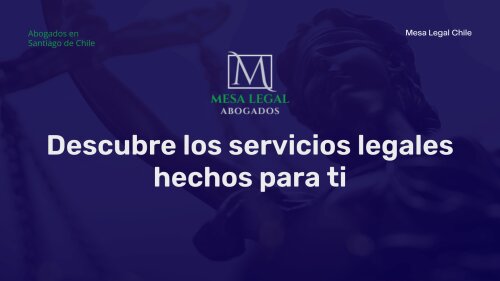Best White Collar Crime Lawyers in Santiago
Share your needs with us, get contacted by law firms.
Free. Takes 2 min.
List of the best lawyers in Santiago, Chile
About White Collar Crime Law in Santiago, Chile
White collar crime refers to non-violent, financially motivated offenses that are typically committed by businesses, professionals, or public officials. In Santiago, Chile, white collar crimes have been under increased scrutiny given the country’s growing economy and tighter regulatory environment. Common white collar crimes include fraud, bribery, embezzlement, insider trading, money laundering, tax evasion, and cybercrime. Chile’s legal system has comprehensive laws to prosecute and prevent such offenses, with specialized courts and prosecutors dedicated to economic crimes.
Why You May Need a Lawyer
If you are involved in a situation related to white collar crime, it is vital to seek expert legal advice. Common scenarios where people often require a lawyer include:
- Being investigated by police or regulatory authorities for financial misconduct
- Receiving subpoenas, formal accusations, or indictments
- Workplace allegations of fraud, theft, or bribery
- Accusations of tax evasion or money laundering by the Servicio de Impuestos Internos (Chilean Internal Revenue Service)
- Facing disciplinary actions from professional or licensing bodies
- Involvement in business deals under legal scrutiny
- Needing defense in court proceedings related to economic crimes
A qualified lawyer can protect your rights, build a strong defense, negotiate with authorities, and guide you through Chile’s often complex legal system.
Local Laws Overview
Chilean law has specific regulations addressing white collar crimes, many of which are set forth in the Penal Code and other special statutes. Key aspects of local law include:
- Penal Code: Defines and prescribes sanctions for crimes like fraud, bribery, and embezzlement.
- Law No. 20.393: Establishes criminal liability for legal entities (corporations), especially for bribery, money laundering, and terrorist financing.
- Anti-Money Laundering Regulation: Imposes reporting obligations on financial institutions and other entities to prevent and detect money laundering.
- Tax Evasion: The Servicio de Impuestos Internos investigates and prosecutes tax crimes, in coordination with public prosecutors.
- Procedural Safeguards: The accused have the right to legal representation, remain silent, and due process as provided in the Criminal Procedure Code.
There are also specialized prosecutorial units, such as the Unidad de Delitos de Alta Complejidad, which focus on economic and complex crimes.
Frequently Asked Questions
What is considered white collar crime in Chile?
White collar crime in Chile generally refers to non-violent offenses involving deceit, fraud, embezzlement, bribery, tax evasion, and other forms of economic or corporate crime.
What penalties can result from a white collar crime conviction?
Penalties vary but may include fines, restitution, imprisonment, disqualification from professional practice, and in some cases, dissolution of legal entities.
Can companies be held criminally liable for white collar crimes?
Yes, under Law No. 20.393, companies can be subject to criminal liability for certain economic crimes, leading to heavy fines and restrictions on operations.
What should I do if I am contacted by law enforcement about a white collar crime?
You should exercise your right to remain silent and contact a qualified lawyer immediately before providing any statement or documentation.
Are there alternatives to imprisonment for white collar offenses?
In some cases, plea deals, fines, or alternative sentences may be negotiated, particularly for first-time offenders or minor infractions. Legal representation is key.
How long do investigations of white collar crimes usually last?
Investigations can be lengthy, often taking months or even years, especially for complex cases involving multiple parties and large amounts of evidence.
Does the law distinguish between intentional and negligent white collar crimes?
Yes, most white collar crimes require intent, but there are offenses related to negligence or breach of duty, particularly in regulatory or tax matters.
Can foreign nationals be prosecuted for white collar crimes in Chile?
Yes, if the crime was committed in Chile or involved Chilean victims, foreign nationals are subject to Chilean jurisdiction and prosecution.
Is it possible to report a suspected white collar crime anonymously?
Yes, complaints can often be submitted anonymously to authorities such as the Fiscalía or the Servicio de Impuestos Internos.
How can I find a qualified white collar crime lawyer in Santiago?
Look for attorneys with experience in economic or corporate law, and consider those registered with the Colegio de Abogados, or who have a proven record in defending white collar cases.
Additional Resources
- Ministerio Público (Fiscalía Nacional): In charge of prosecuting criminal offenses, including white collar crimes.
- Unidad de Delitos de Alta Complejidad: Specialized unit of prosecutors focused on complex economic crimes.
- Servicio de Impuestos Internos (SII): Investigates and prosecutes tax-related crimes.
- Colegio de Abogados de Chile: The national bar association where you can find licensed attorneys with relevant expertise.
- Defensoría Penal Pública: Provides legal defense services for those unable to afford private representation.
Next Steps
If you are facing allegations or investigation for a white collar crime in Santiago, Chile, act quickly to protect your rights:
- Consult with a qualified lawyer experienced in white collar crime as soon as possible
- Gather and safely store any relevant documentation or evidence
- Do not discuss the case with anyone, including authorities, before receiving legal advice
- Comply with all legal requirements and deadlines communicated by authorities
- Consider seeking legal representation through the Colegio de Abogados or Defensoría Penal Pública if you do not have one
Early legal intervention is essential for achieving the best possible outcome and safeguarding your reputation, assets, and freedom.
Lawzana helps you find the best lawyers and law firms in Santiago through a curated and pre-screened list of qualified legal professionals. Our platform offers rankings and detailed profiles of attorneys and law firms, allowing you to compare based on practice areas, including White Collar Crime, experience, and client feedback.
Each profile includes a description of the firm's areas of practice, client reviews, team members and partners, year of establishment, spoken languages, office locations, contact information, social media presence, and any published articles or resources. Most firms on our platform speak English and are experienced in both local and international legal matters.
Get a quote from top-rated law firms in Santiago, Chile — quickly, securely, and without unnecessary hassle.
Disclaimer:
The information provided on this page is for general informational purposes only and does not constitute legal advice. While we strive to ensure the accuracy and relevance of the content, legal information may change over time, and interpretations of the law can vary. You should always consult with a qualified legal professional for advice specific to your situation.
We disclaim all liability for actions taken or not taken based on the content of this page. If you believe any information is incorrect or outdated, please contact us, and we will review and update it where appropriate.












